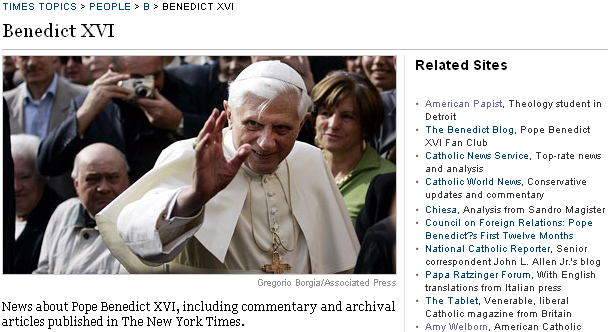Thursday, April 10, 2008
Pope Benedict's appreciation for American religious freedom
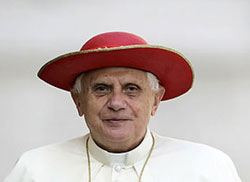 "The Pope likes New York and what it stands for", asserts Jeff Israely in a rather decent article on the Roman Pontiff by the American press ("The American Pope" Time April 3, 2008), examining Benedict's relationship with the American people and his perspectives on the relationship between "church and state" within our country: "The Pope likes New York and what it stands for", asserts Jeff Israely in a rather decent article on the Roman Pontiff by the American press ("The American Pope" Time April 3, 2008), examining Benedict's relationship with the American people and his perspectives on the relationship between "church and state" within our country:
"I think he's really fascinated by the city and what it represents," says Raphaela Schmid, a Rome-based German with the Becket Fund for Religious Liberty, who knows him. "It's about people being two things at once, like Italian Americans or Chinese Americans. He's interested in that idea of coexistence." Israely disputes the idea that the so-called "Vatican enforcer" harbors an antagonism toward "the democratic, pluralistic values that constitute (on our good days) the American brand": ... A survey of the 80-year-old Pontiff's writings over the decades and testimonies from those who know him suggests that Benedict has a soft spot for Americans and finds considerable value in his U.S. church, the third largest Catholic congregation in the world. Most intriguing, he entertains a recurring vision of an America we sometimes lose sight of: an optimistic and diverse but essentially pious society in which faiths and a faith-based conversation on social issues are kept vital by the Founding Fathers' decision to separate church and state. It's not a stretch to say the Pope sees in the U.S.--or in some kind of idealized version of it--a civic model and even an inspiration to his native Europe According to Israely, during his stint as peritus during the Second Vatican Council, Joseph Ratzinger was sympathetic to the arguments of the U.S. delegation (John Courtney Murray?) in the debate over religious freedom: Conservatives opposed [religious freedom]: states must sponsor faith, and the faith should be Roman Catholic. The Americans argued that religious liberty was morally imperative and--from experience--that in a multireligious state, Catholicism could best thrive when the government could not play favorites. The council sided with them, and Ratzinger, anticipating a world composed of jostling religious pluralities, heartily approved. In a 1966 analysis, he wrote, "In a critical hour, Council leadership passed from Europe to the young Churches of America and [their allies]," who "were really opening up the way to the future." Israely admits that Ratzinger's appreciation for the American conception of religious freedom "did not extend to an acceptance that all roads to salvation are equal or to a license for democracy within his church" (how could it, really?) -- nonetheless: [Benedict] came to respect the way Catholic leaders in the U.S. went about their business. A current (non-American) CDF official notes that the U.S. church is the only one that keeps a "serious" doctrinal office rather than an unthinking rubber stamp or an old-boys' club; when conflicts arise, its bishops are actually prepared to discuss them. Moreover, says Levada, "he seems to recognize that we're plain speakers. We don't hide behind words."
The Pope also admires the Americans' role as, in the words of one cleric, "intellectual first responders," especially as the country's great network of Catholic hospitals wrestles with novel problems of medical ethics. "Through the great sphere of worldly experience that the Church has in America," Benedict wrote, "as well as through her faith experience, decisive influences can be passed on." He has shown his comfort with the direct and thoroughly American approach by appointing Americans to the No. 1 and No. 3 spots in his powerful former office [The Congregation for the Doctrine of the Faith].  Israely cites as a prominent example of the Pope's appreciation for America expressed in Without Roots, his 2004 exchange with the president of the Italian Senate, Marcello Pera: It bemoans the European Union's refusal to acknowledge Christianity in a draft constitution, and Pera wonders about bringing back some kind of multidenominational "Christian civil religion." In response, Ratzinger cites Alexis de Tocqueville's Democracy in America and makes the case that America's Founding Fathers were pious men of different denominations who wrote the First Amendment prohibiting state establishment (that is, sponsorship) of religion precisely because sponsorship would stifle all non-established creeds--which they hoped would achieve full and varied flower.Of course, no such bloom would occur if the American soil were not already faith-saturated. But Ratzinger believes in America's "obvious spiritual foundation," its natural, Puritan-instilled DNA. He is well aware that this is eroding; he thinks we watch too much TV and fears that American secularization is proceeding at an "accelerated pace." But he insists that there is a "much clearer and implicit sense" in the U.S. than in Europe of a morality "bequeathed by Christianity." He has also given earnest thought to the mechanics of this civil religion, specifying that to affect the moral consensus, it is not enough for Catholics to rub shoulders with other Christians; they must translate their concerns from doctrinal language into a "public theology" accessible to all.
As far as his Apostolic Journey to America is concerned, Israely believes Benedict will be "less interested in scolding American Catholics than in talking up 'new religious communities ... being formed who quite consciously aim at a complete fulfillment of the demands of religious life'" -- schools of burgeoning Catholic orthodoxy like Thomas Aquinas College in Santa Paula, Calif.; Christendom College in Front Royal, Va.; and Ave Maria University in Ave Maria, Fla -- "eruptions of non-state-related religious vitality at which he thinks we excel."
There are a few points in Israely's article which betray his liberal sympathies -- as when he says "There are times when Benedict's love affair with American religious pluralism seems a bit naive, especially when it clashes with his nonnegotiable doctrinal stands" or "downplaying the idea that Catholics may legitimately balance church teaching against the demands of their conscience." But on the whole I think it worth the read. Israely closes: John Paul II described faith and reason as the twin wings that lift the church. And yet a balanced takeoff has remained elusive. The U.S. is one of the few places where it seems to happen regularly. "America is simultaneously a completely modern and a profoundly religious place. In the world, it is unique in this," says a senior Vatican official. "And Ratzinger wants to understand how those two aspects can coexist." Almost all the things the Pope likes about us--our faith in the real value of plainspokenness, our pluralistic piety and even our wrangles around applying religiously grounded moral principles to increasingly abstruse science--can be understood in light of this quest. If he finds answers in the U.S., they could help define his papacy.
When he arrives on U.S. soil on April 15, we in the press will no doubt be parsing Benedict's every sentence for his opinions on U.S. policy or remonstrance of American morals. But the most important waves emanating from this contact may reverberate well beyond tomorrow's news cycle. John Paul II and the U.S. played as anticommunist co-leads on the 20th century stage. This Pope, more a student of global drama than an eager protagonist, knows that rising religious conflict may be the 21st century's great challenge. He also appears to sense that American power alone won't solve it--but that the power of American values still might. In rummaging through our founding precepts for a path for his own purposes, he might find something important for us to remember too.
Further Reading
Ratzinger/Benedict on "Separation of Church & State"
- "A Tocquevillian in the Vatican", by Dr. Samuel Gregg:
Upon being inducted into the Académie des Sciences Morales et Politiques of the Institut de France in 1992, then-Cardinal Ratzinger remarked that Tocqueville's “ Democracy in America has always made a strong impression on me.“
 Describing Tocqueville as “le grand penseur politique,“ the context of these remarks was Ratzinger's insistence that free societies cannot sustain themselves, as Tocqueville observed, without widespread adherence to ”des convictions éthiques communes.“ Ratzinger then underlined Tocqueville's appreciation of Protestant Christianity's role in providing these underpinnings in the United States. In more recent years, Ratzinger expressed admiration for the manner in which church-state relations were arranged in America, using words suggesting he had absorbed Tocqueville's insights into this matter. Describing Tocqueville as “le grand penseur politique,“ the context of these remarks was Ratzinger's insistence that free societies cannot sustain themselves, as Tocqueville observed, without widespread adherence to ”des convictions éthiques communes.“ Ratzinger then underlined Tocqueville's appreciation of Protestant Christianity's role in providing these underpinnings in the United States. In more recent years, Ratzinger expressed admiration for the manner in which church-state relations were arranged in America, using words suggesting he had absorbed Tocqueville's insights into this matter.
- Biblical Aspects of the Question of Faith and Politics homily delivered on 26 November 1981 for Catholic members of the Bundestag in the church of St. Wynfrith (Boniface).
- Why Church and State Must Be Separate An excerpt from "Theology and the Church’s Political Stance" in Cardinal Joseph Ratzinger Church, Ecumenism and Politics: New Essays in Ecclesiology (NY: Crossroad, 1988 -- republished by Ignatius Press in 2008).
- Benedict XVI on Religion and Public Life Zenit News Service Sept. 17, 2005 - which included his June 2005 remarks to Italian President Carlo Ciampi on church-state relations.
- On October 17, 2005, in a letter to the president of the Italian Senate, Marcello Pera (with whom he co-authored Without Roots: Europe, Relativism, Christianity, Islam), Pope Benedict expressed his support for a "healthy secularity of the state" -- or that which guarantees "to each citizen the right to live his own religious faith with genuine freedom, including in the public realm" and includes "a commitment to guarantee to all, individuals and groups, respect for the exigencies of the common good, [and] the possibility to live and to express one own religious convictions." (The full text of the letter can be found here).
- Secularity: On Benedict XVI and the Role of Religion in Society | Fr. James V. Schall, S.J. | January 9, 2007 (on Benedict's lecture to 59th Study Conference of the Union of Italian Catholic Jurists).
Ratzinger on Europe
Labels: benedict, ratzinger
Sunday, January 20, 2008
Pope Benedict, Sapienza University and the Intolerance of Radical Secularism
La Sapienza University is the largest European university and the most ancient of Rome's three public universities. It was founded in 1303 by Pope Boniface VIII -- in 1870, it was secularized and became the university of the capital of Italy. [Source: Wikipedia]. This year, Pope Benedict XVI was scheduled to speak to 1,000 hand-picked guests in the Aula Magna, the main lecture hall, at the inauguration of the academic year.
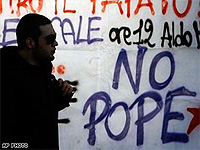 Times have changed, however -- no longer a Christian institution, students and faculty, obstinate in their militant secularism, have voiced their resentment at the Holy Father's scheduled appearance; the faculty with a signed letter of protest signed by 67 lecturers and professors; students with four days of increasingly hostile demonstrations. The Times reports: Times have changed, however -- no longer a Christian institution, students and faculty, obstinate in their militant secularism, have voiced their resentment at the Holy Father's scheduled appearance; the faculty with a signed letter of protest signed by 67 lecturers and professors; students with four days of increasingly hostile demonstrations. The Times reports:
A hundred militant left wing students had occupied the office of Professor Renato Guarini, the university rector, to demand that the papal visit be cancelled because of Benedict's "obscurantist" stand on science in general and the Church's treatment of Galileo as a heretic in particular. Sixty-seven science professors and lecturers at La Sapienza signed a letter to Professor Guarini calling on him to scrap the visit. Professor Guarini said the Pope was "saddened" by the protests.Students had said they would greet the Pope with a "sonic siege" of loud rock music - which he once defined as "the devil's work" - an "anti clerical" gay and lesbian parade and banners reading "No Pope" and "Knowledge needs neither fathers no priests". . . .
Sergio Doplicher, a mathematics lecturer, said "I have no objection to the Pope coming to give us his blessing but have serious reservations about him restating the supremacy of faith over science and of moral principles over the lay values protected by the Italian Constitution".
Behind the controversy over faith and science lies a broader row over what many see as the Vatican's interference in Italian affairs on issues such as stem cell research, abortion and same sex civil unions. The Pope was to speak on the death penalty and the wider theme of the Church's "defence of life".
The La Sapienza student website said Pope Benedict had "condemned centuries of scientific and cultural growth by affirming anachronistic dogmas such as Creationism while attacking scientific free thought and promoting mandatory heterosexuality".
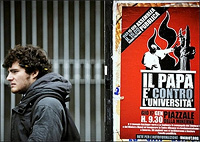 According to Reuters According to Reuters: . . . The first day on Monday revolved around an "anti-clerical" meal of bread, pork and wine and a banner reading: "Knowledge needs neither fathers nor priests".
Meanwhile, a poster bearing the message ''Knowledge is secular'' has appeared outside the university under the statue of Minerva which is its symbol.
In defense of Galileo?
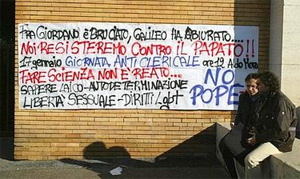 "Fra Giordano [Bruno] was burned, Galileo recanted, We will resist the Papacy, 17 January - Anti-Clerical Day, 12 Noon, Aldo Moro Square.To do science is not a crime, Secular-Self determining Knowledge, Sexual Liberty, LGBT Rights, NO POPE" -- "That's what passes for intelligent discourse in some quarters, friends." Zadok The Roman |
According to Richard Owen the Times, at the root of the faculty's dispute with the pope is remarks made by Cardinal Ratzinger some 17 years ago, concerning the Church's condemnation of Galileo in 1633: In their letter the La Sapienza scientists, including Andrea Frova, author of a study of Galileo, and Carlo Maiani, the head of the Italian National Council for Research, said they felt "offended and humiliated" by a statement made in 1990 by the then Cardinal Joseph Ratzinger suggesting the trial of Galileo for heresy because of his support for the Copernican system was justified in the context of the time.
Pope John Paul II acknowledged that the Roman Catholic Church had erred in condemning Galileo in 1633 for asserting that the Earth revolves around the Sun. Galileo was forced to recant and spent the remaining eight years of his life under house arrest.
John Paul said the Inquisition had "transposed into the realm of the doctrine of the faith" a matter which had to do with scientific investigation, but added it was working "within the knowledge available at the time" and had guarded the integrity of the Catholic Faith. Cardinal Ratzinger, as John Paul's head of doctrine, observed that "At the time of Galileo the Church remained much more faithful to reason than Galileo himself. The process against Galileo was reasonable and just". Unfortunately, the Times reporting (which is indicative of the understanding of the Sapienza faculty) is factually incorrect and reveals a gross misunderstanding of what Ratzinger actually said.
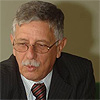 From L'Osservatore Romano, Professor Giorgio Israel (translation by the Papa Ratzinger Forum): They accuse him of having said - in a lecture he gave at La Sapienza on February 15, 1990 {cfr J. Ratzinger, Wendezeit für Europa? Diagnosen und Prognosen zur Lage von Kirche und Welt, Einsiedeln-Freiburg, Johannes Verlag, 1991, pp. 59 e 71) - a statement that was actually from the philosopher of science, Paul Feyerabend: "In the time of Galileo, the Church was much more faithful to reason than Galileo himself. The trial of Galileo was reasonable and just."
But none of them bothered to read the lecture in full and carefully. Its theme was the crisis of faith in itself that science has, and he cited as an example the changing of attitudes about the Galileo case.
If Galileo had become - in the 18th century, the century of the Enlightenment - emblematic of the Church's 'medieval obscurantism', the attitude changed in the 20th century when Ernst Bloch, for instance, pointed out that Galileo never showed convincing proof of a heliocentric cosmos, to the statement by Feyerabend - described by Ratzinger in the lecture as 'an agnostic-skeptic philosopher' - and by Carl von Weiszsacker who said there was a straight line from Galileo to the atom bomb.
These citations were not used by the cardinal to seek vindication or to make justifications: "It would be absurd," he said "to construct a hasty apologetics on the basis of these statements. Faith does not grow out of resentment or the rejection of reason."
The citations he made were clearly used as proof of how much "modernity's doubts about itself have now involved even science and technology."
In other words, the 1990 lecture could well be considered - by anyone who reads it with the minimum attention - a defense of Galilean rationality against the skepticism and relativism of post-modern culture. As John Allen Jr. remarks: In a nutshell, therefore, Benedict is being faulted by the physics professors for quoting somebody else's words, which his full text suggests he does not completely share. (Readers who remember Regensburg can be forgiven a sense of déjà-vu.)
Also by way of John Allen, Jr., the comments by then-Cardinal Joseph Ratzinger on the Galileo case, excerpted from  A Turning Point for Europe? The Church and Modernity in the Europe of Upheavals, Paoline Editions, 1992, pp. 76-79. [The excerpted passage also appears on pages 95-98 of the 1994 Ignatius Press edition]. A Turning Point for Europe? The Church and Modernity in the Europe of Upheavals, Paoline Editions, 1992, pp. 76-79. [The excerpted passage also appears on pages 95-98 of the 1994 Ignatius Press edition].
Benedict cancels -- and turns the tables on Sapienza protestors
January 16, 2008
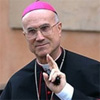 Responding to the protests of faculty members and students, Pope Benedict XVI cancels his appearance at Sapienza University. Notice of the pope's cancellation was conveyed by Cardinal Tarcisio Bertone sent to the rector of the Università La Sapienza, prof. Renato Guarini, together with the address Benedict XVI would have given: Responding to the protests of faculty members and students, Pope Benedict XVI cancels his appearance at Sapienza University. Notice of the pope's cancellation was conveyed by Cardinal Tarcisio Bertone sent to the rector of the Università La Sapienza, prof. Renato Guarini, together with the address Benedict XVI would have given:
Esteemed Rector,the Holy Father had gladly accepted your invitation to visit the Università degli Studi "La Sapienza", to offer in this way a sign of affection and of the high regard in which he holds this illustrious institution, which originated centuries ago at the behest of his venerated predecessor.
But since, at the initiative of a decidedly minority group of professors and students, the conditions for a dignified and peaceful welcome were lacking, it has been judged prudent to delay the scheduled visit in order to remove any pretext for demonstrations that would have been unpleasant for all. But in the awareness of the sincere desire on the part of the great majority of the professors and students for culturally significant words from which they can take encouragement for their personal journey in search of the truth, the Holy Father has arranged to send you the text he prepared personally for the occasion. I gladly act as the agent of his decision, attaching the written address with the hope that all may find within it ideas for enriching reflections and examinations.
I gladly take this opportunity to extend to you, with feelings of profound deference, my cordial regards,
Tarcisio Card. Bertone
Secretary of State
From AsiaNews.it, translation of the speech Benedict XVI planned to deliver Thursday at La Sapienza University in Rome..
According to Zenit News Service, Benedict's address was read by another professor during the inauguration, to much acclaim: During the inauguration ceremony, a professor read the discourse the Holy Father had prepared for the occasion. A standing ovation and students' shouts of "Long live the Pope" followed the reading.Fabio Mussi, the Italian minister of education, and Walter Veltroni, the mayor of Rome, were present.
Meanwhile, Italian leaders voiced their dismay at the Pope's cancellation (Catholic World News): Italian president Giorgio Napolitano released a statement condemning the "inadmissible intolerance" shown by the campus protestors, who had planned to greet the Pope with loud rock music, anti-clerical posters, and parades of militant homosexuals. Prime Minister Romano Prodi said that the protests had "provoke unacceptable tensions and created a climate that does not honor Italy's traditions of civility and tolerance."
Rome's Mayor Walter Veltroni added his perspective that the Pope's appearance on campus would have been "another great opportunity for the city of Rome to show itself as the center of civil dialogue." While intellectual debates are welcome, he said, the "intolerant behavior" of a minority at La Sapienza was "bad for democracy and liberty." The former Italian prime minister, Silvio Berlusconi, went further, saying that the incident was "humiliating" and a "shameful day" for Italy.
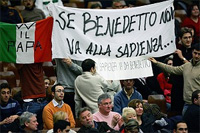 A group of university students of the Communion and Liberation movement greeted the Pope with chants of "Freedom! Freedom!" at the beginning of his general audience AsiaNews.it: A group of university students of the Communion and Liberation movement greeted the Pope with chants of "Freedom! Freedom!" at the beginning of his general audience AsiaNews.it:
"So there are three places where the pope cannot go: Moscow, Beijing, and the university of Rome", commented one of the young people present at the audience. "If Benedict does not go to La Sapienza, La Sapienza comes to Benedict", read one of the banners that the young people raised.
 The pope did not mention the affair, not even in the greeting that he addressed to the students. For the second week, Benedict XVI dedicated the discourse of his general audience to Saint Augustine, dwelling in particular on the last year of the life of the bishop of Hippo, who died during the Vandal assault on his city in 430. The pope emphasised in particular Augustine's call to the pastors to remain close to the faithful in moments of difficulty, as so many priests have done so often throughout history. The pope did not mention the affair, not even in the greeting that he addressed to the students. For the second week, Benedict XVI dedicated the discourse of his general audience to Saint Augustine, dwelling in particular on the last year of the life of the bishop of Hippo, who died during the Vandal assault on his city in 430. The pope emphasised in particular Augustine's call to the pastors to remain close to the faithful in moments of difficulty, as so many priests have done so often throughout history.
January 17, 2008
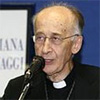 Calling the Sapienza protests a "painful blow to the entire city of Rome," Cardinal Camillo Ruini, the Pope's Vicar for the Diocese of Rome, called on the faithful to gather in St. Peter's Square during the recitation of the Angelus to show their support for Pope Benedict XVI (Catholic News Agency). In contrast to the violent and hate-filled demonstrations at Sapienza, he emphasized the Angelus would be a sign of peace and spiritual solidarity: Calling the Sapienza protests a "painful blow to the entire city of Rome," Cardinal Camillo Ruini, the Pope's Vicar for the Diocese of Rome, called on the faithful to gather in St. Peter's Square during the recitation of the Angelus to show their support for Pope Benedict XVI (Catholic News Agency). In contrast to the violent and hate-filled demonstrations at Sapienza, he emphasized the Angelus would be a sign of peace and spiritual solidarity:
"Next Sunday's event will be a moment of prayer, any other motivation in the people joining us at St. Peter's Square would be unwelcome and out of place," Cardinal Ruini told the Vatican daily L'Osservatore Romano.
The Cardinal explained that "because of its prayerful nature, the Angelus cannot be turned into a political demonstration."
"This will be a moment to show affection for the Holy Father and not a demonstration against the lack of receptivity from La Sapienza. It is an event that want to express the feelings of the majority of Romans, as well as the majority of the La Sapienza community," Cardinal Ruini added.
The gathering at St. Peter's square next Sunday, therefore, "must be in tune with the classic tone of the Angelus, which is a moment to listen to God's word and also a moment to listen to the Holy Father, to be with him, to greet him."
In an interview with 'Corriere della Sera, Ruini also remarked that "some signs of solidarity" with the Pope by attendees of Sappienza University had come too late.
January 18, 2008
- 01/18/08 - Catholic World News reports that the rector of Rome's La Sapienza university has announced that he plans to issue a new invitation to Pope Benedict XVI, in line with "the wishes of the majority" of students and faculty.
Also, the governor of the region of Veneto in northern Italy, Giancarlo Galan, has proposed inviting Pope Benedict XVI to the historic University of Padua, where Galileo once taught. "It would be a great tribute as part of the Galilean celebrations that are taking place this year."
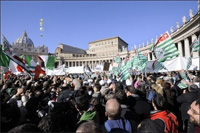 Agence France-Presse (AFP) reports that more than 100,000 people filled St Peter's Square on Sunday in a show of support for Pope Benedict XVI: Agence France-Presse (AFP) reports that more than 100,000 people filled St Peter's Square on Sunday in a show of support for Pope Benedict XVI:The pilgrims gave a roar of approval when the Pope Benedict, speaking after his weekly blessing, said: "I encourage all of you, dear academics, to always be respectful of the opinions of others, and to seek the truth and the good with an open and responsible mind." . . ."I want especially to salute university youths, professors and all of you who have come today in such large numbers to St Peter's Square to ... express your solidarity," the pope said.
In a rare unscripted exhortation at the end of the appearance from his apartment overlooking the iconic square, the pope said: "Let us go forward in this spirit of fraternity and love for freedom and truth, and common commitment for a brotherly and tolerant society."
The final burst of applause from the pilgrims, including La Sapienza students, lasted some three minutes. 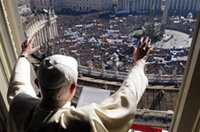 Andrew Haines, a seminarian studying in Rome, attended the Angelus and blogged his experience (In Umbris Sancti Petri January 20, 2008): Andrew Haines, a seminarian studying in Rome, attended the Angelus and blogged his experience (In Umbris Sancti Petri January 20, 2008):Perhaps the most outstanding thing about the whole address was what happened after the traditional, Buona Domenica a tutti, which usually concludes the day. To the resounding applause that continued to sweep the entire square, Benedict stayed in his window and kept waving (something he never usually does). In fact, he even went off-the-script and urged everyone to go forth into the world to deliver this same message of solidarity and peace in the face of opposition; you could tell, he was speaking from the heart, and what better response to a protest last week than a bolstering of fervency this week? In my mind, this is just another example of how God has brought something quite good out of a situation where divisiveness and ignorance formerly prevailed.
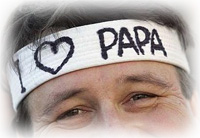
Commentary
- Dangers of anti-Catholic academic extremism, by Hugh McNichol. Catholic News Agency. January 16, 2008:
The dissenting students and faculty are adamant about the perception that the Holy Father is "anti-science," in his papal ministry and his theological ponderings. There really cannot be anything further from the truth than branding the former Joseph Ratzinger, an esteemed theologian and scholar as someone that is an antithesis of scientific research and discovery. Perhaps the real matter at hand here is the inclusion of individuals that have a desire to eliminate any inclusion of theological related theories into the study and development of modern science. It appears to this author that what is going on here is sort of reverse Inquisition, which seeks to defame any pursuit and inclusion of religious beliefs into the empirical world of scientific observation and discovery. This protest by the students and faculty of Rome's Sapienza University is the precipice of a slippery slope that really threatens a global appreciation of Catholic theological development and its historical foundations. The protesters involved in this dispute seem mainly to be concerned with the fact that the Church in the past has at times dealt a rather heavy hand to the empirical sciences and at times was consistently opposed to certain paths of scientific study.
How unfortunate that a university that has in the foundational root of its name and purpose the word, Sapienza…which means wisdom or knowledge is directly opposed to the free exchange and development of scientific ideas simply because they are speculated by the Bishop of Rome. Such animosity against a papal visit clearly indicates the university has excluded many aspects of free philosophical thought and its open expression for the extremely parochial view of secular science sans theological and historical appreciation for the pursuit of higher studies in the physical sciences. Could it be that there is a movement at play here that reeks of secular humanism and purely empirical science that is seeking to undermine the philosophical expressions of natural law and the expression of right reason?
- Joaquin Navarro-Valls on the pope, science, and La Sapienza la Repubblica January 17, 2008:
In truth, however, the invitation to Benedict XVI wasn't handled especially well, since it was issued by the Rector without being confirmed by the Academic Senate. In addition, the presence of the pope became caught up in a political struggle internal to the university itself, which would probably have erupted in some other way, but which was able to exploit this high-profile event that was ideally suited for obtaining its ends.
Even though the internal context of the university is highly complex, one still has to understand the reasons that were adopted in support of the dissent from the visit of the pope, on the part not only of a group of 67 professors, a modest three percent of the faculty, but also a noisy, albeit small, group of students.
In effect, it's from this point of view that the most original elements of what's happened can be found. . . .
- Shunning a truth-seeker, by Fr. Raymond De Souza. National Post, (Canada) January 17, 2008:
There is no doubt that La Sapienza turning its back on the pope is a historic moment. Certainly, it is a moment that has horrified Italy. And Italy should be horrified, for it means that La Sapienza has also turned its back on the search for truth, and on freedom in the search for that truth.
- Silencing the Pope, by Father John Flynn. Zenit News. January 20, 2008 - on "cultural clashes and impoverished secularism."
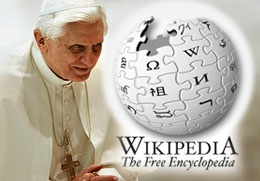 Update Italian professors used Wikipedia to attack the Pope Catholic News Agency. February 6, 2008: Update Italian professors used Wikipedia to attack the Pope Catholic News Agency. February 6, 2008:The Vatican daily L'Osservatore Romano is reporting that 67 professors from La Sapienza University in Rome who wrote a letter opposing a visit by Pope Benedict XVI based their opposition on a quote taken out of context from Wikipedia.org.
The professors portrayed themselves as defenders "of freedom of research and of knowledge." "In the name of ‘freedom of research and of knowledge,' they have taken false information to be true, accepting an assertion without checking whether it is factual," the Vatican newspaper reported. L' Osservatore maintained that if any of the professors had checked the facts before signing the letter, "they would have realized that the author took the quote from a discourse by Ratzinger that is found under the title ‘Papa Benedetto XVI' at Wikipedia.org, the online encyclopedia that is edited by internet users and that no man of science would use as an exclusive source for his research, unless he checked the veracity of the content."
"That Wikipedia in all likelihood is the source of the quote is evident by the fact that the letter from the 67 professors makes reference to a speech by Cardinal Ratzinger on March 15, 1990 in Parma. The speech was given, but it took place in Rome, at La Sapienza University on exactly that day," L' Osservatore continued. "The surprising thing is that whoever took the quote from Feyerabend could not have read the rest of the entry in Wikipedia, as he would have realized that the meaning of Ratzinger's statement is exactly the opposite of what the 67 claimed the Pope was saying."
- Update Rector of La Sapienza visits with the Pope Catholic News Agency February 21, 2008:
According to Vatican sources, Guarini brought the presents with him that he was supposed to give to the Pope on January 17, the date of his cancelled commencement speech at Italy’s largest university.
According to the Vatican Press Office, the meeting between Pope Benedict and Guarini lasted 30 minutes, during which both spoke about "the role of the University in contemporary society," and its contribution to "building a new Humanism."
There were also "some reflections" about the cancellation of the Pope's visit, but the possibility of a new invitation for the Pope to visit La Sapienza, was not discussed.
Guarini gave the Pope two presents: a medal with the university's coat of arms and a facsimile copy of the 1303 Pope Boniface VIII's bull creating the 'Studium Urbis,' which would later become La Sapienza.
Labels: benedict, extremism, ratzinger, secularism
Tuesday, November 13, 2007
Pope Benedict Roundup!
- In August, Pope Benedict turned down a personal request from U.S. Secretary of State Condoleeza Rice to meet with him en route on her visit of the Middle East, a move which some liberal critics at the time interpreted as a "diplomatic snub". The Vatican, however, quelled such idle gossip and foolish speculation (Catholic News Service, September 20, 2007):
"The only reason she wasn't received was that she came during a period when the pope doesn't receive anyone. It was a purely technical question of protocol," an informed Vatican source told Catholic News Service Sept. 20.
The source said it was "absolutely not" the Vatican's intention to rebuff Rice or signal disagreement with U.S. policy on the Middle East.
Rice was about to travel to the Middle East for diplomatic talks in early August when the request for a papal meeting was made. The pope was vacationing at his summer residence in Castel Gandolfo, outside Rome.
Even as it declined the request, the source said, the Vatican made it clear that top officials of the Vatican's Secretariat of State would be happy to meet with Rice at any time.
- In September Pope Benedict's brother, Msgr. Georg Ratzinger attended a Latin Mass in Regensburg. The blog Catholic Church Conservation has the photos and details.
- On September 1-2, 2007, Pope Benedict visited Loreto, Italy. Here is the official website for the visit in Italian and, from the Vatican, documentation of the Pastoral Visit to Loreto on the occasion of the Agorà of the Italian youth, with links to his homilies and addresses.
Blog By the Sea provides a comprehensive roundup as well.
- September 7-9th, of course, was the Holy Father's seventh apostolic journey to Austria, to to celebrate the 850th anniversary of the Marian shrine at Mariazell -- a subject of a separate roundup at our Benedict Blog.
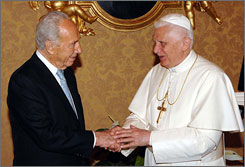 On September 9, 2007, Shimon Peres, in his first foreign visit as president of Israel, met with Pope Benedict at Castel Gandolfo and members of the Vatican curia, to discuss Catholic-Israeli relations and the situation in the Middle East. AsiaNews.it reports: On September 9, 2007, Shimon Peres, in his first foreign visit as president of Israel, met with Pope Benedict at Castel Gandolfo and members of the Vatican curia, to discuss Catholic-Israeli relations and the situation in the Middle East. AsiaNews.it reports:Rome (AsiaNews) – The Israeli President Shimon Peres is “quite optimistic” regarding negotiations between Israel and the Holy See and has declared that “within the years end the most important problems will be resolved”. Answering a question put forward by AsiaNews, during a press conference, he also said that he had invited Benedict XVI to visit Israel. ...
On the long standing question of the implementation of the Fundamental Agreement, 13 years on from its signing, the Holy See statement urges “a rapid conclusion to the important ongoing negotiations and the beginning of a constant dialogue with Israeli Authorities and local Christian communities, in view of their participation in working for the common good”.
September 3 last –after a long summer pause – and after years of deadlock, negotiations between the Holy See and Israel recommenced. They aim to lead to an agreement regarding issues of taxation and Church properties, which have been waiting implementation since ’93.
The Vatican statement makes no reference whatsoever to a possible visit by Benedict XVI to Israel, even if the pope has already expressed a positive opinion in the past. Peres told journalists that he was “moved” by the pope’s reaction to his proposal and defined Benedict XVI as “great spiritual figure”, underlining that “the Spirit” incarnated in the religions can give an important impulse to peace and the elimination of violence, “assassins and killings”. For background on this story we refer you to: Israel-Vatican Relations & The Fundamental Agreement Against The Grain February 12, 2007.
 On September 17, Benedict XVI welcomed the news that the cause for beatification of Cardinal François-Xavier Nguyên Van Thuân has opened Zenit News Service: On September 17, Benedict XVI welcomed the news that the cause for beatification of Cardinal François-Xavier Nguyên Van Thuân has opened Zenit News Service:The Holy Father said: "I gladly take this occasion to recall, once more, the luminous witness of faith that this heroic pastor left us. Bishop Francis Xavier -- as he liked to introduce himself -- was called to the house of the Father during the autumn of 2002, after a long period of sickness that he faced with total abandonment to God's will."
The Pontiff called Cardinal Van Thuân a "man of hope" and noted that it was this virtue that enabled him to endure physical and moral difficulties, including 13 years spent in prison.
Benedict XVI also noted the cardinal's focus on the present moment.
"Cardinal Van Thuân loved to repeat that the Christian is a man of now, of the present moment, to welcome and live with Christ’s love," the Holy Father said. "In this ability to live the present moment his intimate abandonment in God’s hands shines through as does the evangelical simplicity which we all admired in him.
"Is it possible -- he would ask -- that he who trusts in the Father would refuse to let himself be embraced in his arms?" Here is the full text of Benedict's address on the opening of the cause for Cardinal Van Thuân.
- On September 19, the Vatican confirmed Pope Benedict's visit to the United States in April 2008 (Catholic World News). Plans for the papal trip were confirmed in November with an announcement by the U.S. Conference of Catholic Bishops: Pope to visit Ground Zero, Yankee Stadium Newsday November 12, 2007):
The six-day trip will include an address to the United Nations -- at the invitation of UN Secretary General Ban Ki-moon -- as well as a visit to the Basilica of the National Shrine of the Immaculate Conception in Washington, D.C., where Pope Benedict will meet with bishops of the United States. He will visit the White House on April 16.The pope will visit Ground Zero on the final day of his trip, Archbishop Pietro Sambi told the U.S. Conference of Catholic Bishops on Monday, and say a public Mass at Yankee Stadium on April 20. [Full intinerary and roundup from American Papist] Ratzinger last visited the United States in 1988, then at the invitation of Fr. Richard J. Neuhaus -- at that time still a Lutheran pastor -- to deliver a paper on biblical criticism. His stay was met with no small amount of controversy and heckling by gay demonstrators. For details, see: Pope Benedict XVI: Grace Under Fire Against The Grain August 31, 2007.
- On September 27, 2007, Pope Benedict XVI praised the example of Pope Paul VI. Attending a concert on the 110th anniversary of his birth, Benedict heralded his predecessor:
The Holy Father said his predecessor was "prudent and courageous in guiding the Church with realism and evangelical optimism, fueled by indomitable faith."
He said that Paul VI "hoped for the coming of the 'civilization of love,' convinced that evangelical charity constitutes the indispensable element for building an authentic universal brotherhood."
“Only Christ, true God and true man, can convert the human soul and render it capable of contributing to the realization of a just and supportive society," Benedict XVI added. "Let us pray that his example and his teachings will be an encouragement and stimulus for us to love Christ and the Church more and more, enlivened by that indomitable hope that sustained Paul VI until his death."
- October 9, 2007 - Catholic News Agency: Five towns in the Italian Alps have sent a 115 foot-tall Italian fir tree to Benedict XVI to be used as the Vatican Christmas Tree, as a sign of the “generosity and religiosity” of the region.
- October 16, 2007 - Pope completes second encyclical, a meditation on Christian hope, by John Thavis. Catholic News Service:
Pope Benedict XVI has completed his second encyclical, a meditation on Christian hope, Vatican sources said.
The text, tentatively titled "Spe Salvi" ("Saved by Hope"), is about 65 pages, sources said Oct. 16. No release date has been set for the document.
The working title comes from St. Paul's letter to the Romans, in which he wrote: "For in hope we have been saved." The encyclical is said to explore the Christian understanding of hope, with reference to modern philosophy and the challenges of disbelief.
The pope worked on the encyclical this summer, when he had time to write during his sojourns in northern Italy and at his villa outside Rome. At the same time, he was working on a third encyclical that deals with social themes, Vatican officials said.
- On October 17, 2007, Pope Benedict XVI announced the creation of 23 new cardinals, including 2 Americans. Thomas Peters (American Papist) provides a comprehensive roundup of coverage and a full list of the designees:
Among the cardinals-designate are two Americans: Abp. Foley (widely predicted to be nominated) and ... Archbishop Daniel Nicholas DiNardo of Galveston-Houston, in an upset over Washington DC's Archbishop Donald Wuerl.Why is the appointment of cardinals a revealing event? John Allen explains: "Whenever a pope names new members to the church’s most exclusive club, he inevitably makes a statement – about his own priorities, about where the church is going, and ultimately about the sort of men in line to take over when he’s gone."
- October 18, 2007 - A New Musical Season Opens at the Vatican – And Here's the Program, by Sandro Magister (www.chiesa): "In the span of just a few days, a series of events have unfolded at the Vatican which, taken all together, foretell new provisions – at the pope's behest – to foster the rebirth of great sacred music. . . ."
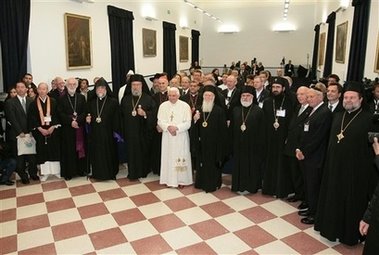 October 21, 2007 - Pope Benedict attended the inaugeration of the 21st International Encounter of Peoples and Religions. The meeting, organized by the Community of Sant'Egidio in Naples until Oct. 23, has as its theme "Toward a World Without Violence: Religions and Cultures in Dialogue." John Allen, Jr. reported on the Pope's meeting with other religious leaders: October 21, 2007 - Pope Benedict attended the inaugeration of the 21st International Encounter of Peoples and Religions. The meeting, organized by the Community of Sant'Egidio in Naples until Oct. 23, has as its theme "Toward a World Without Violence: Religions and Cultures in Dialogue." John Allen, Jr. reported on the Pope's meeting with other religious leaders: Addressing leaders of other religions meeting today in Naples, Pope Benedict XVI called upon the world’s religions to be “artisans of the civilization of love.” Never, Benedict said, can religious faith legitimately be invoked to justify hatred or violence.
The pope vowed that the Catholic church “intends to continue to pursue the path of dialogue,” while “respecting the differences among the various religions.” He spoke at the Capodimonte Seminary in Naples, flanked by the Patriarch of Constantinople, Bartholomew I. . . .
Benedict invoked the memory of Pope John Paul II’s 1986 summit of religious leaders in Assisi – ironically, an event about which then-Cardinal Joseph Ratzinger expressed reservations on the grounds that it could inadvertently promote a form of religious relativism, in which one religion seems as good as another.
As Benedict XVI spoke, a large picture of John Paul II seated alongside the Dalai Lama and other religious leaders during the Assisi gathering in 1986 was visible over his left shoulder.
While praising the 1986 event, Benedict XVI did not repeat John Paul II’s moment of silent prayer in the company of other religious leaders.
While Benedict stressed inter-religious cooperation, he did not enter into details of how these relationships might move forward. Some observers thought the pope might make reference to a recent letter from 138 Muslim leaders, for example, which attempted to lay out the basis for further theological dialogue.
Instead, Benedict simply expressed a “lively wish” that a spirit of dialogue will spread, “above all where tensions are most strong, where liberty and respect for others are negated, and where men and women suffer the consequences of intolerance and incomprehension.” Here is the full text of Pope Benedict XVI's address to religious leaders in Naples.
- October 29, 2007 - Pope Benedict challenges pharmacists to refuse to dispense abortion pill Catholic News Agency:
An international gathering of Catholic pharmacists was received by Pope Benedict today at the Vatican. In his talk with them, the Holy Father insisted that health professionals must be allowed the right to exercise conscientious objection when it comes to dispensing drugs that cause abortion or euthanasia— words that are sure to impact the debate about the abortion pill in the U.S.
The Pope reminded the pharmacists that protecting human life from conception until natural death is part of their job. Benedict also encouraged them "to reflect upon the ever broader functions they are called to undertake, especially as intermediaries between doctor and patient," and upon their role in educating patients "in the correct use of medications" and in informing them of "the ethical implications of the use of particular drugs." American Papist provides expanded coverage of this address.
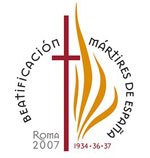 On October 29, Pope Benedict participated in the largest mass beatification in history of 498 Spanish Civil War martyrs. Catholic News Service reports: On October 29, Pope Benedict participated in the largest mass beatification in history of 498 Spanish Civil War martyrs. Catholic News Service reports:... "This martyrdom in ordinary life is an important witness in today's secularized society," he said.
The beatified were killed in the years 1934, 1936, and 1937. They include two bishops, 24 priests, 462 members of religious orders, a deacon, a sub-deacon, a seminarian, and seven lay Catholics. The breadth of the persecution was also reflected in the range of their ages with the youngest being 16 and the oldest 71.
Seven thousand clergy are estimated to have died in the persecutions. The violence came from leftist groups who saw the Church as a symbol of wealth, repression, and inequality. Their continual attacks helped provoke General Francisco Franco into rebellion against the elected left-wing government. The civil war lasted from 1936 to 1939, after which the victorious Franco ruled as dictator for forty years. According to the Catholic News Service, the ceremony was not without controversy:As the Vatican beatification Mass was ending, a group of young Roman leftists, calling themselves the "Militants," marched in front of Rome's Basilica of St. Eugene, a church entrusted to the care of Prelature of Opus Dei, the predominantly lay movement founded in Spain.The protesters carried a banner that read, "One who has killed, tortured and exploited cannot be beatified." They also carried a large copy of Pablo Picasso's anti-war painting, "Guernica." [NOTE: See Torture in his history taints Spanish martyr's beatification, by John Allen, Jr. National Catholic Reporter October 12, 2004].
The Italian news agency ANSA reported that a scuffle broke out when several parishioners tried to confiscate the banner and painting. Police were called to break up the confrontation. The Spanish Bishops' Conference has responded that the beatification of 498 martyrs, victims of religious persecution in the 1930s, is a testament of their virtue and faith, not a political statement (Zenit News Service October 24, 2007).
 Towards the end of October, Pope Benedict attended a concert held in his honor, during which the Bavarian Radio Symphony Orchestra and Choir played Beethoven's Ninth Symphony. The event was organized to thank the Pope for his visit to Bavaria in September 2006. After the concert he offered some reflections on the great composition: Towards the end of October, Pope Benedict attended a concert held in his honor, during which the Bavarian Radio Symphony Orchestra and Choir played Beethoven's Ninth Symphony. The event was organized to thank the Pope for his visit to Bavaria in September 2006. After the concert he offered some reflections on the great composition:At the end of the concert, the Holy Father recalled that Beethoven composed his final symphony in 1824, after a period of isolation and difficulty "which threatened to suffocate his artistic creativity."
Yet the composer "surprised the public with a composition that broke with the traditional structure of the symphony," rising at the end "in an extraordinary finale of optimism and joy," the Pontiff said.
Benedict XVI continued, "This overwhelming sentiment of joy is not something light and superficial; it is a sensation achieved through struggle" because "silent solitude [...] had taught Beethoven a new way of listening that went well beyond a simple capacity to experience in his imagination the sound of notes read or written." This was akin to "the perceptivity given as a gift by God to people who obtain the grace of interior or exterior liberation."
The Pope recalled how in 1989, when the Bavarian Radio Symphony Orchestra and Choir had played Beethoven's Ninth Symphony for the fall of the Berlin Wall, they altered the text from "Ode to Joy" to "Freedom, Spark of God," thus expressing "more than the simple sensation of a historic moment. True joy is rooted in the freedom that only God can give." (See also: Pope calls Beethoven's 'Ninth' masterful expression of optimism, by John Thavis. Catholic News Service. October 29, 2007).
Articles on Pope Benedict XVI
- Has German pope re-Italianized the Roman Curia? - that's the question floating around Rome, in response to " a string of Vatican appointments left Italian prelates in high places." Catholic News Service examines the claim.
- The members of the mainstream media (and even various Catholics) have often criticized (to the point of ridicule) Pope Benedict's unwavering devotion to proclaiming the truth of the Gospel and the salvific unity of the Jesus Christ and the Catholic Church. What a refreshing suprise, then, to read that a Rabbi praises Pope Benedict for his clear teaching. Catholic News Agency reports:
New York, Sep 4, 2007 / 09:33 am (CNA).- A rabbi from Monsey, New York, has lauded Pope Benedict XVI for reinstating the Latin Mass and affirming that only Catholic Church qualifies as the one, true Church.
In an article titled The Pope’s Got A Point and published in the July 18 issue of The Jewish Press, Rabbi Yerachmiel Seplowitz says he is “not at all put off by the fact that the leader of another religion sees that religion as primary.”
“I’ve always found it curious that people of different religions get together in a spirit of harmony to share their common faiths,” he writes. “By definition, these people should have strong opposition to the beliefs of their ‘colleagues’ at the table. The mode of prayer of one group should be an affront to the other group.
“What the pope is saying – and I agree 100 percent – is that there are irreconcilable differences, and we can’t pretend those differences don’t exist,” he states. “I can respect the pope for making an unambiguous statement of what he believes.”
While all people, created in God’s image, and their beliefs are worthy of respect, “we don’t need to play games of ‘I’m okay, your okay’ with beliefs we find unacceptable,” he writes.
- Benedict’s Mozart: What the Pope Learned From His Favorite Composer, by Father Andreas Kramarz, LC. National Catholic Register September 18, 2007:
Austria’s president honored Pope Benedict on the final day of his visit to the “Alp Republic” Sept. 9 with Mozart music in the Vienna Concert House. After the music, the Holy Father met with Church and civil volunteers in order to honor their service.
Wolfgang Amadeus Mozart was born in the Austrian city of Salzburg in 1756, but that’s not why his music was played for the Pope. In fact, there have hardly been any cultural events that Pope Benedict has attended in which a piece of Mozart has not been performed.
That’s because it is well known that Mozart is the Pope’s favorite composer. . . .
- From Ignatius Insight: Selections from Benedict's Jesus, The Apostles, and the Early Church, based on Pope Benedict XVI's weekly teaching on the relationship between Christ and the Church, Jesus, The Apostles, and the Early Church tells the drama of Jesus' first disciples--his Apostles and their associates--and how they spread Jesus' message throughout the ancient world.
- Sandro Magister on The Secret Angelus Messages of Pope Benedict -- on the media's tendency to reproduce the words of the Pope during his Sunday addresses only where they pertain to events in the news and especially political issues, ignoring what is most substantial. ("They're secret in the sense that the media ignore them for what they mainly are: the explanation of the Gospel of that day's Mass. Apart from those present, almost no one knows this").
- Pope Benedict XVI and the New Ecclesial Movements | Bishop Stanislaw Rylko, President of the Pontifical Council for the Laity, Introduction to New Outpourings of the Spirit (Ignatius Press, 2007) -- The volume consists of two fundamental texts by (then) Cardinal Ratzinger on the ecclesial movements and new communities within the Church since the Second Vatican Council.
- From John Allen Jr., an Extract from interview with Benedict XVI on Cardinal Leo Scheffczyk This extract from an interview with Pope Benedict XVI that took place last November is part of a new book on the work of the late Cardinal Leo Scheffczyk, a Pole who spent his career in Germany, and who was a personal friend of Joseph Ratzinger. Scheffczyk died in December 2005. The extract was published in the Oct 20 issue of Corriere della Sera, Italy's leading daily newspaper. The translation from Italian is by NCR. The interview with Benedict XVI was conducted by Fr. Johannes Nebel, a member of a new religious order called "The Spiritual Family 'The Work'", to which Scheffczyk was especially close.
 From the prolific Fr. James V. Schall, several features since our last roundup: "No Weighing, No Disputing, No Such Thing": Ratzinger and Europe, with particular attention to Ratzinger's Europe: Today and Tomorrow and Christianity and the Crisis of Cultures (Ignatius Press, 2007); "Where God is, there is the future" | On Benedict XVI in Austria Ignatius Insight October 1, 2007, and Why the Bewilderment? Benedict XVI on Natural Law Ignatius Insight October 27, 2007. From the prolific Fr. James V. Schall, several features since our last roundup: "No Weighing, No Disputing, No Such Thing": Ratzinger and Europe, with particular attention to Ratzinger's Europe: Today and Tomorrow and Christianity and the Crisis of Cultures (Ignatius Press, 2007); "Where God is, there is the future" | On Benedict XVI in Austria Ignatius Insight October 1, 2007, and Why the Bewilderment? Benedict XVI on Natural Law Ignatius Insight October 27, 2007.
It is out of our appreciation for Fr. Schall's many commentaries on our Holy Father that we are pleased to announce SchallonBenedict.blogspot.com -- a blog dedicated to chronicling these very articles. Enjoy!
- Catholic News Service reports that Sales of Benedict's Jesus of Nazareth has hit 2 million copies worldwide:
The 400-page book has been the number one book on the Catholic Best-Sellers List for the past three months, according to the Catholic Book Publishers Association. It shot to the top slot starting with the association's August list, which reflected June sales.
"Jesus of Nazareth" also ranked among the top 10 hardcover nonfiction books on the New York Times Best Sellers' list after its English release and stayed on the list for several weeks.
The pope currently is working on completing his second volume on the life of Jesus, expected to cover Christ's passion, death and resurrection.
 From Carl Olson (Insight Scoop): Further reflections on Jesus of Nazareth, with remarks from authors Roy Schoeman (author of Salvation is from the Jews) and Dr. Regis Martin, professor of Systematic Theology at Franciscan University of Steubenville. From Carl Olson (Insight Scoop): Further reflections on Jesus of Nazareth, with remarks from authors Roy Schoeman (author of Salvation is from the Jews) and Dr. Regis Martin, professor of Systematic Theology at Franciscan University of Steubenville.
Also, from Craig Blomberg, Ph.D. Distinguished Professor of New Testament at the Denver [evangelical] Seminary: There are plenty of places where one might quibble with this or that minor point of exegesis. But they pale in comparison with the number of pages on end where the reviewer finds himself underlining, agreeing with, and including exclamation points, thank you's, and even smiling faces in the margins of his copy of the book. I am indebted to our graduate, Jon Haley, long-time church worker in Spain, for first calling this book to my attention and suggesting that it was worthy of review. Evangelical readers can derive considerable encouragement from the pope's positions and devotional inspiration from his applications.
And Rabbi Alan Brill of the Jewish News Weekly of Northern California declares: The optimists win — pope is reaching out to Jews: Jesus of Nazareth offers an interpretation of the New Testament — and thereby of Christianity — that is surprisingly favorable to Judaism, one in which “the Jewish people and its faith are the very roots of Christianity.”
In unequivocal terms, Jesus is presented as a Jew, a follower of true biblical and rabbinical traditions. Jesus’ teachings are presented as an outgrowth and fulfillment of Sinai and Jewish ritual law.
Traditional Christian approaches treated Jewish interpretation of the Bible as false, rabbinic traditions as perversions of the Bible and painted Jews as blind to the truth and not doing God’s will.
How does Pope Benedict accomplish this feat of reconciliation? ... READ MORE
Labels: benedict roundup, ratzinger
Friday, August 31, 2007
Pope Benedict XVI: Grace Under Fire
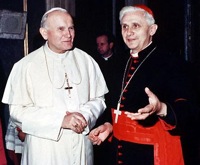 The Pope is scheduled to visit the U.N. in New York City next year. From the blog of the New York Times, a post recalling When Ratzinger Last Visited New York: The A.P. reported that on Jan. 26, 1988, “several prominent rabbis refused to attend a meeting with Ratzinger because he maintains that Judaism finds its fulfillment in Christianity.” The following day, gay demonstrators, angered by Cardinal Ratzinger’s contention that homosexuality is a “moral disorder,” heckled him during his talk at the Saint Peter’s Church, a Lutheran congregation in Midtown.
The demonstrators — some shouting “He’s no man of God,” “inquisitor” and “Nazi” — interrupted a talk by Cardinal Ratzinger for about 10 minutes. The A.P. reported that Cardinal John J. O’Connor, the archbishop of New York at the time (he died in 2000), “sat somberly beside him during the disruption at the presentation.” Six demonstrators were arrested.
Cardinal Ratzinger’s talk, and a closed-door conference on Jan. 28, 1988, were organized by the Center on Religion and Society at the Rutherford Institute, a conservative legal foundation based in Charlottesville, Va. It was actually Fr. Richard J. Neuhaus (at that time still a Lutheran pastor) who coordinated then-Cardinal Ratzinger's visit to the United States. The text of Ratzinger's address: Biblical Interpretation in Crisis: On the Question of the Foundations and Approaches of Exegesis Today; the proceedings of the conference were published in Biblical Interpretation in Crisis: The Ratzinger Conference on Bible and Church. Eerdmans Pub Co (May 1989).
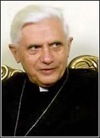 In an interview with NewsMax.com, Fr. Neuhaus recalled Ratzinger's encounter with obnoxious protestors intent on disrupting the Cardinal's speech: In an interview with NewsMax.com, Fr. Neuhaus recalled Ratzinger's encounter with obnoxious protestors intent on disrupting the Cardinal's speech:
. . . Throughout, the cardinal was the very picture of tranquility. When he got a chance to speak he prefaced his lecture, which was on the subject of biblical interpretation, with a moving reflection on the 1968 student rebellion in Europe that helped him to understand more deeply the indispensability of civility in human relations.
On this and other occasions, it was obvious to me that his tranquility is rooted in a tried and tested faith. The next day the tabloid headlines blazoned, "Gays Protest Vatican Biggy." He chuckled at his new title of Vatican Biggy.
From the perspective of a protestor, demonstrating typical liberal support for freedom of speech and the civil exchange of ideas: ... Ratzinger took the podium and began to speak. As soon as he finished his first sentence, a group of about eight people to the left of the crowd leaped to their feet and began chanting "Stop the Inquisition!" They chanted feverishly and loudly, their voices echoing throughout the building. The entire room was fixated on them. Activists suddenly appeared in the back of the church and began giving out fliers explaining the action. Two men on the other side of the room jumped up and, pointing at Ratzinger, began to scream, "Antichrist!" Another man jumped up, in one of the first few rows near the prelate, and yelled, "Nazi!" All over the church, angry people began to shout down the protestors who were near them; chaotic yelling matches broke out. . . . Suddenly, I jumped up on one of the marble platforms and, looking down, I addressed the entire congregation in the loudest voice I could. My voice rang out as if it were amplified. I pointed at Ratzinger and shouted: "He is no man of God!" The shocked faces of the assembled Catholics turned to the back of the room to look at me as I continued: "He is no man of God -- he is the Devil!"  In an article at the dawn of Benedict XVI's pontificate, Alice von Hildebrand recalled the visit to New York as well ( No Prophet In His Own Land: Reflections on Benedict XVI Crisis June 2005): My Latin blood started boiling. Before I knew it, I got up and said at the top of my voice, “Shame on you!” The police were called and they forced the dissidents to leave the Church; they went outside and continued screaming. The cardinal stood quietly on the podium with a grieved but gentle expression on his face. I could not help but have the feeling that he was praying, “Father, forgive them, for they know not what they do.”
Peace was finally reestablished, and once again, His Eminence proceeded with his text as if nothing had happened. He was clearly deeply recollected. But it was not the end of this ugly affair. After some ten minutes, other protesters seated in the back of the Church started spitting their gall once again and giving expression to their unholy rage. The same scenario was repeated; but this time, the police were nearby, and the speaker could complete his talk.
His attitude throughout was admirable—peaceful, calm, loving, no bitterness, no resentment. He accepted their insults and, in doing so, gave testimony to the teaching of Christ: Love those who hate you. Let's hope our Papa will receive a kinder, warmer welcome on his next visit to the Big Apple. Labels: benedict, ratzinger
Tuesday, August 21, 2007
Pope Benedict Roundup!
[Note: There was a lot of topics to cover from our last roundup in June 2007; if some are omitted, it is either due to a lapse on my part or -- as in the case of Benedict XVI's letter to Chinese Catholics -- a wish to make it the subject of an individual post. Enjoy.]
- On June 16, Pope Benedict XVI received Beatitude Chrysostomos II, Archbishop of New Justiniana and Cyprus. From the Vatican website, the English translations of Benedict and Chrysostomos II's addresses to each other and their common declaration.
- On June 17, Pope Benedict XVI visited Assisi on the anniversary of the conversion of St. Francis. From the Vatican website, links to translations of all five addresses, along with a photo gallery.
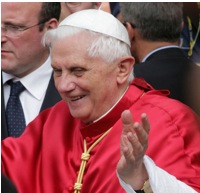 In his homily during the Mass celebrated outside the Basilica of St. Francis, Pope Benedict recalls the interfaith / ecumenical gatherings initiated by his predecessor, and adds his own perspective on the interreligious dialogue: In his homily during the Mass celebrated outside the Basilica of St. Francis, Pope Benedict recalls the interfaith / ecumenical gatherings initiated by his predecessor, and adds his own perspective on the interreligious dialogue:
. . . I cannot forget in today's context the initiative of John Paul II, my Predecessor of holy memory, who in 1986 wanted to gather here at a Prayer Meeting for Peace representatives of the Christian denominations and of the different world religions.
It was a prophetic intuition and a moment of grace, as I said a few months ago in my Letter to the Bishop of this Town on the occasion of the 20th anniversary of that event. The choice of celebrating the meeting at Assisi was prompted precisely by the witness of Francis as a man of peace to whom so many people, even from other cultural and religious positions, look with sympathy.
At the same time, the light of the "Poverello" on that initiative was a guarantee of Christian authenticity, since his life and message are so visibly based on Christ's choice to reject a priori any temptation of religious indifferentism which would have nothing to do with authentic interreligious dialogue.
The "spirit of Assisi", which has continued to spread throughout the world since that event, counters the spirit of violence and the abuse of religion as a pretext for violence. Assisi tells us that faithfulness to one's own religious conviction, and especially faithfulness to the Crucified and Risen Christ, is not expressed in violence and intolerance but in sincere respect for the other, in dialogue, in a proclamation that appeals to freedom and reason and in the commitment to peace and reconciliation.
The failure to combine acceptance, dialogue and respect for all with the certainty of faith which every Christian, like the Saint of Assisi, is bound to foster, proclaiming Christ as the Way, the Truth and the Life of man (cf. Jn 14: 6), the one Saviour of the World, can be neither an evangelical nor a Franciscan attitude. (Via Carl Olson, who also recommends on this subject Fr. Schall's commentary on "The Spirit of Assisi: On Praying With Other Religions" (Ignatius Insight October 16, 2006).
- On June 24, Pope Benedict gave the closing address to participants of the European Meeting of University Professors in Rome. Touching on themes from his Regensburg address, he pointed to several issues worthy of reflection: 1) "the need for a comprehensive study of the crisis of modernity" - countering the "false dichotomy" between theism and authentic humanism, divine law and human freedom. "The anthropocentrism which characterizes modernity can never be detached from an acknowledgment of the full truth about man, which includes his transcendent vocation"; 2) "the broadening of our understanding of rationality" - beyond the confinement of the "purely empirical," fostering a cooperation between faith and reason; 3) the contributions of Christianity to humanism -- "The question of man, and thus of modernity, challenges the Church to devise effective ways of proclaiming to contemporary culture the 'realism' of her faith in the saving work of Christ":
Knowledge can never be limited to the purely intellectual realm; it also includes a renewed ability to look at things in a way free of prejudices and preconceptions, and to allow ourselves to be "amazed" by reality, whose truth can be discovered by uniting understanding with love. Only the God who has a human face, revealed in Jesus Christ, can prevent us from truncating reality at the very moment when it demands ever new and more complex levels of understanding. The Church is conscious of her responsibility to offer this contribution to contemporary culture. Some amazing photography of Benedict's visit to Assisi, taken by Benodette @ The Benedict Forum.
- In June, Pope Benedict also visited the Vatican Library and Secret Archives, reminding the employees of their vocation:
The Pontiff told the staff that on his 70th birthday, he asked Pope John Paul II for permission to "dedicate myself to study and research the interesting documents and finds you safeguard so carefully, real masterpieces that help us to follow the story of humanity and of Christianity."
"In his providential designs, the Lord had other plans for me," Benedict XVI said, "and here I am today among you not as a passionate student of ancient texts, but as a pastor called to encourage the faithful to work together for the salvation of the world, each one carrying out God's will where he has placed them."
At the end of his visit, the Pope exhorted the staff to consider their work "as a true mission to be carried out with passion and patience, gentleness and in the spirit of faith […] aware that the Gospel message is passed on through your coherent Christian testimony." Here is the full text of Benedict's address to the staff of the Vatican Library.
According to Zenit, The Vatican Library was founded in 1450 by Pope Nicholas V and houses 1,600,000 ancient and modern books; 8,300 printed documents, including 65 parchments; 150,000 manuscript codes and archive papers; 300,000 coins and medals; and some 20,000 works of art.
- Benedict XVI has re-established that a two-thirds majority will always be required for the election of a Pope. The Holy Father decreed the norm in a June 11 "motu proprio" written in Latin. It was published today by L'Osservatore Romano and is effective immediately. (Zenit News June 26, 2007).
- On June 28, speaking at vespers celebration held at the Basilica of St. Paul Outside the Walls, Pope Benedict celebrated the Solemnity of Saints Peter & Paul:
[F]rom the outset, Christian tradition has considered Peter and Paul to have been inseparable, even if each had a different mission to accomplish.
Peter professed his faith in Christ first; Paul obtained as a gift the ability to deepen its riches. Peter founded the first community of Christians who came from the Chosen People; Paul became the Apostle to the Gentiles. With different charisms they worked for one and the same cause: the building of Christ's Church. and dedicated the Jubilee year of June 2008-June 2009 to Paul the Apostle in celebration of the 2,000th anniversary of the saint's birth. From Zenit, here is Father Sassi, superior general of the Society of St. Paul, on the question: "What would St. Paul do if he were alive today?"
- July 7th, Pope Benedict issued the long-anticipated motu proprio Summorum Pontificum, announcing new norms that will allow the Roman Missal promulgated by Pope John XXIII in 1962 to be used as an extraordinary form of the liturgical celebration. In an interview with Zenit, the Wanderer's Father John Zuhlsdorf provides an analysis of the document and its implications.
A further list of recommended resources and links to discussion can be found here; for ongoing chronicles of the reaction to the document, see SummorumPontificum.net.
- On July 15th, Pope Benedict expressed his gratitude to God (and his hosts) for being able to enjoy the mountains of Northern Italy, where he vacationed until the 21st. Father Federico Lombardi, director of the Vatican press office, confirmed that Benedict XVI was chiefly occupied with working on the second volume of Jesus of Nazareth.
At a July 18 press conference, Cardinal Tarcisio Bertone elaborated on the Pope's vacation habits: "The Pope is playing the piano a lot but he is also working. He has a great capacity to write a lot. He is writing the second part of his book, 'Jesus of Nazareth,' and a new encyclical with a social theme -- I don't know when it will be published -- and other things.
"He is a volcano of creativity. He is working on things like the message for World Youth Day 2008 and other things 'in pectore.' And he is drawing out and elaborating further themes he has already written about."
And in the Italian daily Il Giornale, Benedict's secretary Msgr. George Ganswein decribed the glowing reception given to the Pope by the residents of the Veneto region: The Holy Father, "was surprised, even overwhelmed" by "so much affection, kindness and love," from the people he encountered on his vacation, but "he has learned this affectionate language very well," Monsignor Georg Gänswein told the Italian daily Il Giornale.
"At the beginning, I have shared this observation," Monsignor Gänswein said. "Afterward, I have been able to see how the Pope has learned this affectionate language very well, responding with simple and humble, but very eloquent, gestures.
"And the people immediately realize that the Pope is not looking for applause and does not want to call attention to himself, but instead, only wants to guide the faithful to Christ. This is the authentic objective of the Pope's reactions. And the hearts of the people have understood this very well."
- Benedict devoted his July 22 Angelus to the spectre of war, issuing a renewed plea for peace among nations:
If men lived in peace with God and with each other, the earth would truly resemble a "paradise." Unfortunately, sin ruined this divine project, generating divisions and bringing death into the world. This is why men cede to the temptations of the evil one and make war against each other. The result is that in this stupendous "garden" that is the world, there open up circles of hell.
War, with the mourning and destruction it brings, has always been rightly considered a calamity that contrasts with God's plan. He created everything for existence and, in particular, wants to make a family of the human race. . . . Benedict recalled the letter of his predecessor, Benedict XV's "Nota Alle Potenze Belligeranti" (Note to the Warring Powers), calling for an end to the "useless bloodbath" of the First World War.Benedict XV's "Nota" did not limit itself to condemning war; it indicated, at a juridical level, the ways to construct an equitable and durable peace: the moral force of law, balanced and regulated disarmament, arbitration in disputes, freedom on the seas, the reciprocal remission of war debts, the restitution of occupied territories, fair negotiations to resolve problems.The Holy See's proposal was oriented toward the future of Europe and of the world, according to a project that was Christian in inspiration but able to be shared by all because it was founded on the law of nations. It is the same program that the Servants of God Paul VI and John Paul II followed in their memorable speeches at the United Nations, repeating in the name of the Church: "No more war!"
- On July 24, 2007, Pope Benedict took part in another question-and-answer session with priests from the dioceses of Belluno-Feltre and Treviso, Italy.
The questions were on topics including the education and Catholic formation of youth, the priest shortage, divorce and remarriage, immigration into Europe, evangelism, burdens facing priests and educators, sports, and the Vatican II Council.
The Vatican has the English translation of the exchanges. Teresa Polk (Blog by the Sea) links to some earlier translations from the PapaRatzinger Forum. The tenth question was made the subject of a column by Sandro Magister: All Against All: The Postconciliar Period Recounted by Ratzinger, Theologian and Pope, responding to a priest who expressed his disappointment that so many hopes and dreams by those who participated in the Second Vatican Council had been dashed.
In Other News . . .
On a Lighter Note . . .
Labels: benedict roundup, ratzinger
|
From the new blog

|

 Israely cites as a prominent example of the Pope's appreciation for America expressed in Without Roots, his 2004 exchange with the president of the Italian Senate, Marcello Pera:
Israely cites as a prominent example of the Pope's appreciation for America expressed in Without Roots, his 2004 exchange with the president of the Italian Senate, Marcello Pera: According to Reuters:
According to Reuters: From L'Osservatore Romano, Professor Giorgio Israel (translation by the Papa Ratzinger Forum):
From L'Osservatore Romano, Professor Giorgio Israel (translation by the Papa Ratzinger Forum):
 The Pope is scheduled to visit the U.N. in New York City next year. From the blog of the New York Times, a post recalling When Ratzinger Last Visited New York:
The Pope is scheduled to visit the U.N. in New York City next year. From the blog of the New York Times, a post recalling When Ratzinger Last Visited New York: In an article at the dawn of Benedict XVI's pontificate, Alice von Hildebrand recalled the visit to New York as well (No Prophet In His Own Land: Reflections on Benedict XVI Crisis June 2005):
In an article at the dawn of Benedict XVI's pontificate, Alice von Hildebrand recalled the visit to New York as well (No Prophet In His Own Land: Reflections on Benedict XVI Crisis June 2005):
 "The Pope likes New York and what it stands for", asserts Jeff Israely in a rather decent article on the Roman Pontiff by the American press (
"The Pope likes New York and what it stands for", asserts Jeff Israely in a rather decent article on the Roman Pontiff by the American press ( Describing Tocqueville as “le grand penseur politique,“ the context of these remarks was Ratzinger's insistence that free societies cannot sustain themselves, as Tocqueville observed, without widespread adherence to ”des convictions éthiques communes.“ Ratzinger then underlined Tocqueville's appreciation of Protestant Christianity's role in providing these underpinnings in the United States. In more recent years, Ratzinger expressed admiration for the manner in which church-state relations were arranged in America, using words suggesting he had absorbed Tocqueville's insights into this matter.
Describing Tocqueville as “le grand penseur politique,“ the context of these remarks was Ratzinger's insistence that free societies cannot sustain themselves, as Tocqueville observed, without widespread adherence to ”des convictions éthiques communes.“ Ratzinger then underlined Tocqueville's appreciation of Protestant Christianity's role in providing these underpinnings in the United States. In more recent years, Ratzinger expressed admiration for the manner in which church-state relations were arranged in America, using words suggesting he had absorbed Tocqueville's insights into this matter.  Times have changed, however -- no longer a Christian institution,
Times have changed, however -- no longer a Christian institution, 
 Responding to the protests of faculty members and students, Pope Benedict XVI cancels his appearance at Sapienza University.
Responding to the protests of faculty members and students, Pope Benedict XVI cancels his appearance at Sapienza University. 

 Calling the Sapienza protests a "painful blow to the entire city of Rome,"
Calling the Sapienza protests a "painful blow to the entire city of Rome,"  Agence France-Presse (AFP) reports that
Agence France-Presse (AFP) reports that 
 Update
Update  On September 9, 2007,
On September 9, 2007,  On September 17,
On September 17, 
 On October 29, Pope Benedict participated in the largest mass beatification in history of
On October 29, Pope Benedict participated in the largest mass beatification in history of  Towards the end of October, Pope Benedict attended a concert held in his honor, during which the Bavarian Radio Symphony Orchestra and Choir played Beethoven's Ninth Symphony. The event was organized to thank the Pope for his visit to Bavaria in September 2006.
Towards the end of October, Pope Benedict attended a concert held in his honor, during which the Bavarian Radio Symphony Orchestra and Choir played Beethoven's Ninth Symphony. The event was organized to thank the Pope for his visit to Bavaria in September 2006.  From the prolific Fr. James V. Schall, several features since our last roundup:
From the prolific Fr. James V. Schall, several features since our last roundup: 
 In an interview with NewsMax.com,
In an interview with NewsMax.com, 
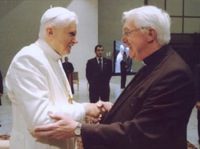
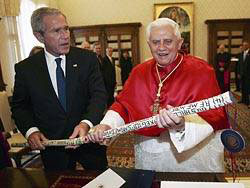
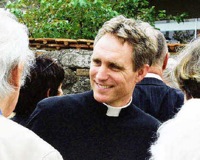
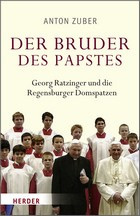 From the Benedict Forum,
From the Benedict Forum, 